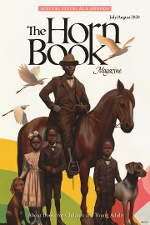Happy Anniversary: The People Could Fly
The People Could Fly: American Black Folktales told by Virginia Hamilton, illustrated by Leo and Diane Dillon, was published by Alfred A. Knopf in 1985. We look back on this iconic Coretta Scott King Author Award winner (also a CSK Illustrator honor) as it celebrates its thirty-fifth anniversary.
 Since I was a girl, my grandmother would tell me stories about growing up in Mount Olive, North Carolina. Born in 1924, she and her family were sharecroppers. When she was a child, my grandmother picked cotton, strawberries, and potatoes with her family to ensure that they could pay rent on the land on which they lived. My grandmother lived with her great-grandmother, Grandma Best, who had been enslaved. If Grandma Best had been the storytelling type, I could imagine her telling stories like the ones in Virginia Hamilton’s The People Could Fly.
Since I was a girl, my grandmother would tell me stories about growing up in Mount Olive, North Carolina. Born in 1924, she and her family were sharecroppers. When she was a child, my grandmother picked cotton, strawberries, and potatoes with her family to ensure that they could pay rent on the land on which they lived. My grandmother lived with her great-grandmother, Grandma Best, who had been enslaved. If Grandma Best had been the storytelling type, I could imagine her telling stories like the ones in Virginia Hamilton’s The People Could Fly.
Published in 1985, The People Could Fly is a collection of Black American folktales retold by the brilliant and inimitable Virginia Hamilton. Throughout her distinguished career, Hamilton wrote it all — realism and fantasy for both teens and younger readers; easy readers; nonfiction. The People Could Fly was her best remembered venture into retelling folk literature. In the introduction, Hamilton states, “They [the stories] show you how I tell the black folktales. For they are told in my own voice, echoing the voices of the slave and fugitives, some of whom are my ancestors. To this very day, folktales are being told, altered, retold, and made. A tale naturally changes as it is told by one person to another.” Although the stories have been altered in Hamilton’s interpretations, they continue to hold their own timeless power.
What is most powerful about these tales is that they have been told for so long and by so many people. At the end of many of the stories, Virginia Hamilton lets the reader know that the tales she is retelling are not just told by Black people in the United States but by people in South America, the Caribbean, and Africa. Despite the cruelties of slavery, Black people throughout the diaspora held onto these old tales that had been used to teach and entertain. While the characters might change and the language of the teller might differ, the message does not. In many of the stories, we see a smaller animal or person outwit a larger, more powerful figure with tricks and intelligence.
 Of all the stories in the book, the title story, “The People Could Fly,” is the most powerful. Here, a group of enslaved Black people regain their wings and fly to freedom. One of the things that always drew me to this book was the cover art by Leo and Diane Dillon, which depicted this particular story. We see ten or so Black people of varying ages dressed in tattered clothing floating in the air. There is a Black woman holding a child and looking up and past the group. I always felt she was imagining her child’s future in freedom. One full of hope and possibility.
Of all the stories in the book, the title story, “The People Could Fly,” is the most powerful. Here, a group of enslaved Black people regain their wings and fly to freedom. One of the things that always drew me to this book was the cover art by Leo and Diane Dillon, which depicted this particular story. We see ten or so Black people of varying ages dressed in tattered clothing floating in the air. There is a Black woman holding a child and looking up and past the group. I always felt she was imagining her child’s future in freedom. One full of hope and possibility.
But the enslaved men and women don’t regain use of their wings until they remember the ancient words: “Kum...yali, kum buba tambe.” It is through remembering and retelling these stories that Black Americans were able to thrive and survive. As Hamilton states in her introduction, “These tales were created out of sorrow. But the hearts and minds of the black people who formed them, expanded them, and passed them on to us were full of love and hope. We must look on the tales as a celebration of the human spirit.” With the continued assault on Black people’s minds, bodies, and spirits, it is imperative that these stories of love and hope continue to be retold. The next generation must be reminded that they come from a people that know how to fly.
 From the July/August 2020 issue of The Horn Book Magazine: Special Issue: ALA Awards.
From the July/August 2020 issue of The Horn Book Magazine: Special Issue: ALA Awards.
Single copies of this special issue are available for $15.00 including postage and may be ordered from:
Kristy South
Administrative Coordinator, The Horn Book
Phone 888-282-5852 | Fax 614-733-7269
ksouth@juniorlibraryguild.com
ALREADY A SUBSCRIBER? LOG IN
We are currently offering this content for free. Sign up now to activate your personal profile, where you can save articles for future viewing.







Add Comment :-
Be the first reader to comment.
Comment Policy: